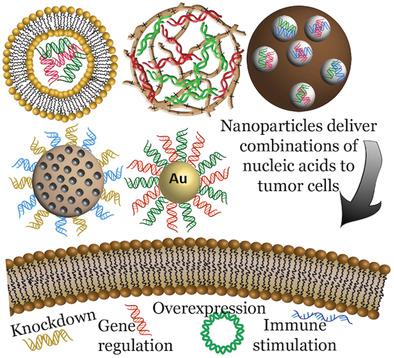当前位置:
X-MOL 学术
›
Adv. Mater.
›
论文详情
Our official English website, www.x-mol.net, welcomes your feedback! (Note: you will need to create a separate account there.)
Cancer-Targeting Nanoparticles for Combinatorial Nucleic Acid Delivery.
Advanced Materials ( IF 29.4 ) Pub Date : 2019-06-20 , DOI: 10.1002/adma.201901081 Hannah J Vaughan 1 , Jordan J Green 1 , Stephany Y Tzeng 1
Advanced Materials ( IF 29.4 ) Pub Date : 2019-06-20 , DOI: 10.1002/adma.201901081 Hannah J Vaughan 1 , Jordan J Green 1 , Stephany Y Tzeng 1
Affiliation

|
Nucleic acids are a promising type of therapeutic for the treatment of a wide range of conditions, including cancer, but they also pose many delivery challenges. For efficient and safe delivery to cancer cells, nucleic acids must generally be packaged into a vehicle, such as a nanoparticle, that will allow them to be taken up by the target cells and then released in the appropriate cellular compartment to function. As with other types of therapeutics, delivery vehicles for nucleic acids must also be designed to avoid unwanted side effects; thus, the ability of such carriers to target their cargo to cancer cells is crucial. Classes of nucleic acids, hurdles that must be overcome for effective intracellular delivery, types of nonviral nanomaterials used as delivery vehicles, and the different strategies that can be employed to target nucleic acid delivery specifically to tumor cells are discussed. Additonally, nanoparticle designs that facilitate multiplexed delivery of combinations of nucleic acids are reviewed.
中文翻译:

用于组合核酸递送的癌症靶向纳米颗粒。
核酸是一种很有前途的治疗方法,可用于治疗包括癌症在内的多种疾病,但它们也带来了许多递送挑战。为了有效且安全地递送至癌细胞,核酸通常必须被包装到载体中,例如纳米颗粒,这将使它们被靶细胞吸收,然后释放到适当的细胞区室中以发挥作用。与其他类型的治疗方法一样,核酸的递送载体也必须经过设计以避免不必要的副作用;因此,此类载体将其货物靶向癌细胞的能力至关重要。讨论了核酸的类别、有效细胞内递送必须克服的障碍、用作递送载体的非病毒纳米材料的类型,以及可用于将核酸特异性递送至肿瘤细胞的不同策略。此外,还回顾了促进核酸组合多重递送的纳米颗粒设计。
更新日期:2020-04-01
中文翻译:

用于组合核酸递送的癌症靶向纳米颗粒。
核酸是一种很有前途的治疗方法,可用于治疗包括癌症在内的多种疾病,但它们也带来了许多递送挑战。为了有效且安全地递送至癌细胞,核酸通常必须被包装到载体中,例如纳米颗粒,这将使它们被靶细胞吸收,然后释放到适当的细胞区室中以发挥作用。与其他类型的治疗方法一样,核酸的递送载体也必须经过设计以避免不必要的副作用;因此,此类载体将其货物靶向癌细胞的能力至关重要。讨论了核酸的类别、有效细胞内递送必须克服的障碍、用作递送载体的非病毒纳米材料的类型,以及可用于将核酸特异性递送至肿瘤细胞的不同策略。此外,还回顾了促进核酸组合多重递送的纳米颗粒设计。


























 京公网安备 11010802027423号
京公网安备 11010802027423号